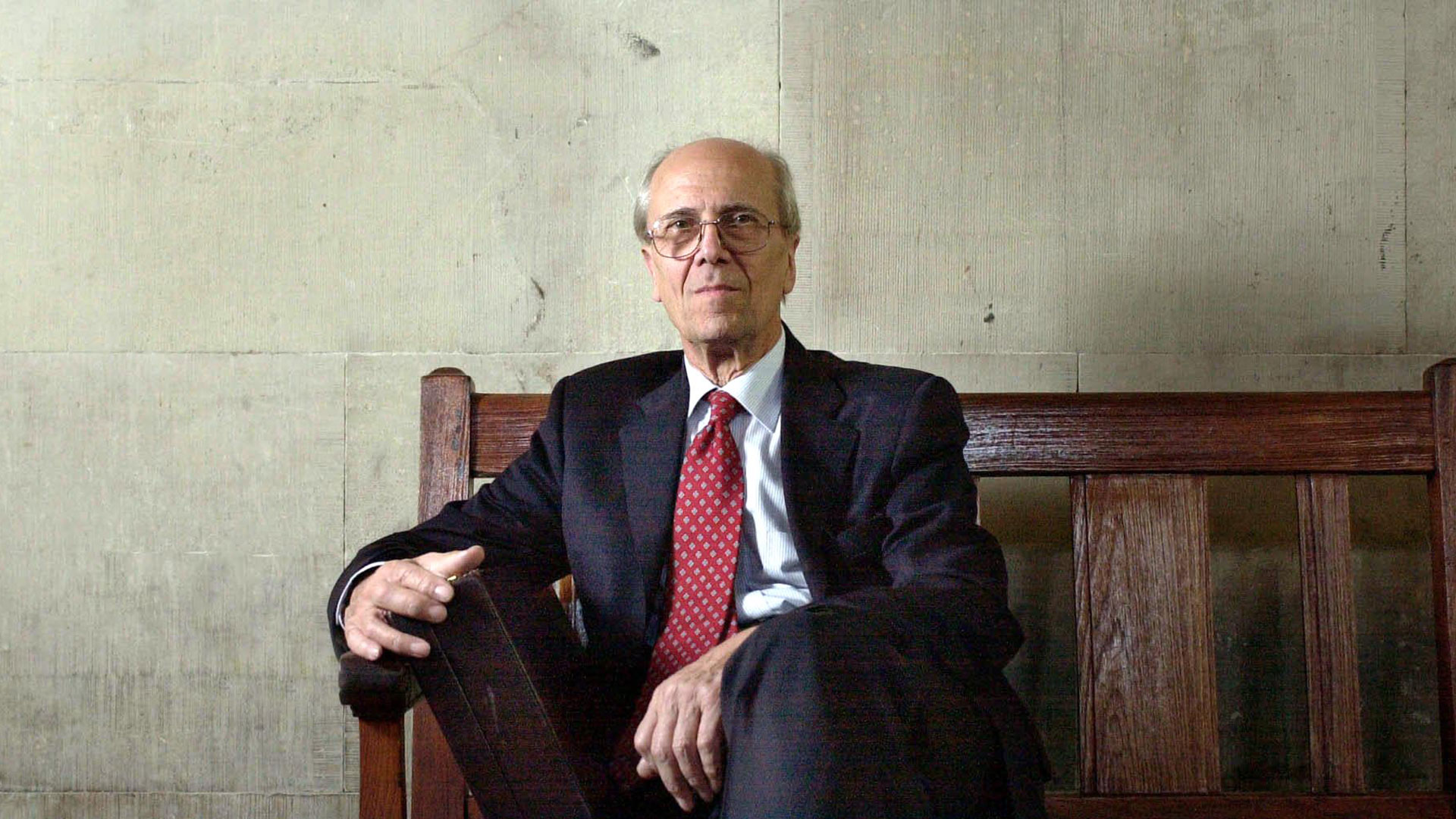I’ve been a Conservative my whole life and I’ll be damned if I’m going to be kicked out now
Nevertheless, he is not surprised by UKIP’s recent successes. The significant factor, he says, is the failure of a Conservative leadership that is out of touch with ordinary people, responsible for ill-thought through policies that alienate traditional Tory voters and, in terms of the basic mechanics of running government, has, as he puts it, “fucked it up”.
I meet Norman Tebbit at his large house in the pretty market town of Bury St Edmunds, Suffolk. He answers the door wearing a warm smile and a comfy V-neck sweater and invites me into his study for morning coffee. A well thumbed copy of 1984 and a Harold Wilson biography sit conspicuously on a shelf beside a framed picture of one of Thatcher’s 1980s cabinets.
Our conversation takes place a fortnight before the recent local election successes enjoyed by UKIP. The results would have come as no surprise to Tebbit. “It’s not just the ground vacated by the Tories [Farage] can go into,” he says. “He can appeal to traditional Labour voters, too.
“Immigration, low-level crime, welfare – they’re not the concerns of the guy who lives in a house at the end of a long gravel drive and has three Volvos parked outside, one for the au pair,” he says. “They’re the concerns of the bloke on the council estate. The bloke who works at Barclays bank doesn’t give a bugger for welfare!
“But if you’re living just on the margins here then you’re very angry that the government squeezes you but doesn’t squeeze certain other people!”
Our 2020 Impact Report
The Big Issue has given more than £1 million support to Big Issue vendors struggling due to the lockdown restrictions. To mark the significant milestone, we have published an impact report, documenting the seismic shift the organisation has undergone in the past 12 months.
View ReportTebbit is keen to remind me at regular intervals that this is “not about whether you agree with it or not” but a practical analysis of the attitudes and perceptions that drive people to vote the way they do. “The bloke who is laughing his way to the bank is Farage,” he says. “Because he has broadened from the issue of Europe to a much wider thing now.”
Advertising helps fund Big Issue’s mission to end poverty
The problem is, he says, the current Conservative leadership lacks the common touch to tap into these concerns. Along with Thatcher herself, he helped widen the appeal of the Conservatives to the huge swathes of Sun-reading working people who bought into their aspirational rhetoric.
“Even before our generation, there were the post-war characters such as Willie Whitelaw and Douglas-Home. They might have been upper-class but they all had something about them. They had all sheltered in a ditch with a private soldier from somewhere or other, both scared out of their wits as the shells rattled around them.”
A lack of such formative experiences is what hamstrings the current crop of ministers, he says. “Most of them haven’t even worked in a bank!” he laments. “Today’s ministers went straight into politics. The consequences are that they don’t perceive much of what’s going on in the rest of the world.”
Today’s ministers went straight into politics. The consequences are that they don’t perceive much of what’s going on in the rest of the world
It’s not just a lack of connection with the public that has hindered them, he says. It’s their inability to get to grips with the day-to-day running of government. “They fucked it up,” he surmises, with a wince. “Some of these ministers these days don’t talk to their civil servants. They get their special adviser to talk for them. And then they come to me and say, ‘It’s dreadful, my officials won’t do what I want!’ And I Say, ‘What do you think it was like for me?’”
Tebbit half-jokes that, when he became Secretary of State for Employment in 1981, “they still thought that they sponsored the TUC! So on my first day in charge I got some boys around my desk and said, ‘Right, first thing’s first – what’s happened to the bust of Ernie Bevin? I remember it used to be on the mantelpiece in the ministerial office.’
“And they said, ‘Oh, we put that down in the basement – we didn’t think you’d want it around.’ And I said, ‘Why ever not? Look, you have to understand that Ernie Bevin was the greatest minister of Labour that this country has ever seen. Go back and read the history of what happened to the labour force during the second world war. The man was a genius! So put the bust back up today!’”
Advertising helps fund Big Issue’s mission to end poverty
His deep respect for a man from the opposite side of the political spectrum is based on old-fashioned political pragmatism. It’s an ability to get things done, not the fanciful blue-sky thinking of Cameron’s callow breed, that he admires. After he had been severely injured in the Brighton bombing, he spent three months running the department of trade and industry from his hospital bed. After the successful privatisation of British Telecom, he decided to sneak out of hospital to make a surprise appearance at the celebratory party being held at his office.
“I walked in and said, ‘So this is what you buggers get up to when I’m away!’” he laughs. “There were two civil servants who I happened to know were Labour supporters who thought privatisation was a terrible idea. I went up to them and said, ‘Why are you two celebrating? You were against the whole bloody idea!’ And they said, ‘That’s right, but people said we couldn’t do it. But we did it and we did it bloody well!’
Why shouldn’t a mother marry her daughter? Why shouldn’t two elderly sisters living together marry each other?
“I’d hope that would be the ethos under a Labour government, too. But you’ve got to get your officials on-side. You have to understand them.”
Tebbit has a new line in gentle reason that contrasts with the ‘get on your bike’ rhetoric he was famous for in his heyday. But, rather pleasingly I suppose, he retains the ability to veer off road from time to time.
“I’m ranting now,” he beams. “But one last comment: gay marriage.” I hunker down into my armchair and listen up. “Whether you’re in favour or not. The government discussed it for 20 minutes on the morning of its announcement. They’d done no work on it beforehand.
“I said to a minister I know: have you thought this through? Because you’re doing the law of succession, too. When we have a queen who is a lesbian and she marries another lady and then decides she would like to have a child and someone donates sperm and she gives birth to a child, is that child heir to the throne?”
Advertising helps fund Big Issue’s mission to end poverty
A silence hangs momentarily between us as I try to process this complex scenario. I eventually nod and he continues. “It’s like one of my colleagues said – we’ve got to make these same-sex marriages available to all.
“It would lift my worries about inheritance tax because maybe I’d be allowed to marry my son. Why not? Why shouldn’t a mother marry her daughter? Why shouldn’t two elderly sisters living together marry each other?”
There is another brief pause. A flash of Tebbit’s scary Spitting Image rendition appears in my mind as I search for something non-committal to say.
He fixes me with a wide mischievous grin: “I quite fancy my brother!” he says.










